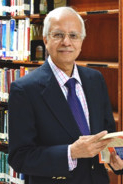 Learning Cafe - Session 04: Neoliberalism: Its Historical Roots and its Impact on Pakistani Society
Learning Cafe - Session 04: Neoliberalism: Its Historical Roots and its Impact on Pakistani Society
Center for Teaching and Learning (CTL) invited Mr. Rahat Ul Ain, from the School of Governance and Society, currently working as Professor of Practice at the University of Management and Technology to share his thoughts on "Neoliberalism: Its Historical Roots and its Impact on Pakistani Society". This learning cafe shares with you what could be next for us as a faculty member and what could be next for students with which we interact and what else could be for the administration and the management of the university.
Mr. Rahat Ul Ain started by explaining what neoliberalism actually is,” About 40 years ago a new social order was imposed on the world known as neoliberalism. In simple terms, it is a restoration of the rule of the markets and a reduced role of the state. The free market acts in line with its own interests and with little consideration for salaried workers and the masses of the world population. The state's role is to enforce this new social order, free circulation of goods and capital at a world level is ensured.”
He continued, Neoliberalism cannot be described as a model of development; it must be seen as a new social order, the purpose of which was the restoration of the income and wealth of the upper fraction of the ruling classes but it is necessary to explain how this restoration was performed and when we go to its roots where it started 40 years ago then it will become even clearer what it really does to the societies.
Neoliberalism is the social order that emerged from the destruction of this earlier social compromise between the Keynesian dispensation and the salary debarkers. Further, he mentioned a quote by George W. Bush which starts like “this freedom is the almighty's gift to every man and woman of this world and as the greatest power on earth, we have an obligation to spread freedom.